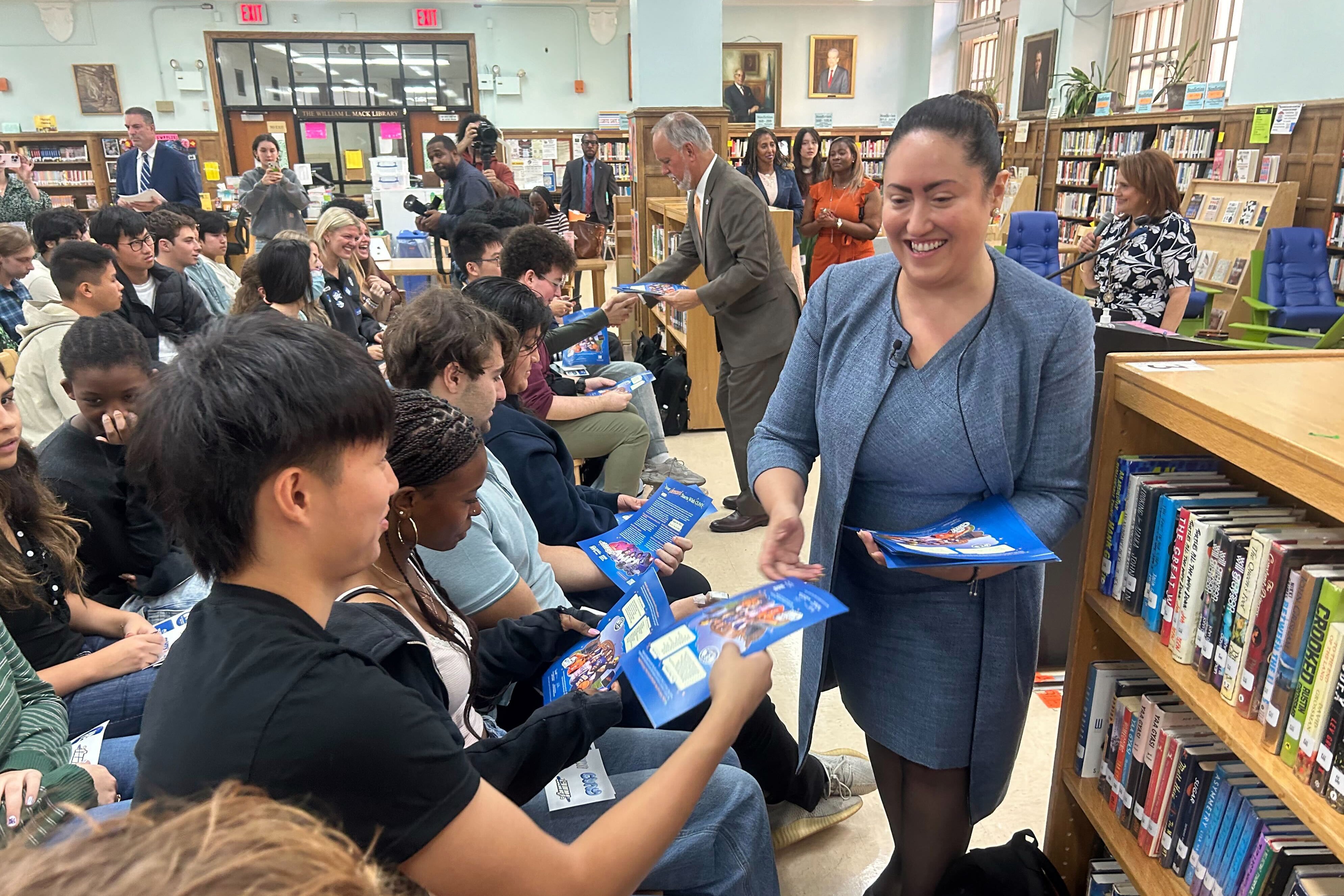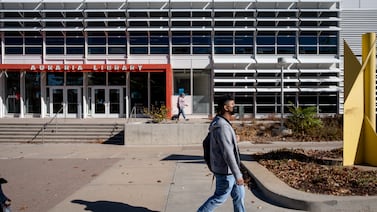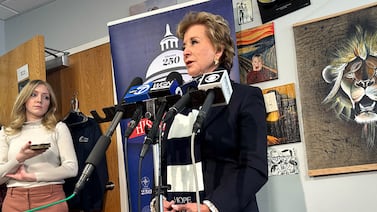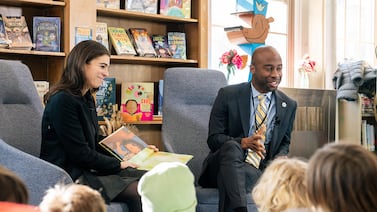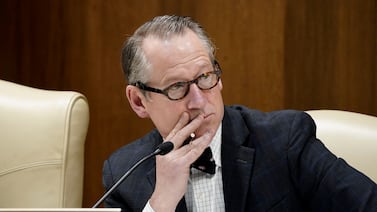Sign up for Chalkbeat New York’s free daily newsletter to keep up with NYC’s public schools.
Newly minted New York City schools Chancellor Melissa Aviles-Ramos stopped by the nation’s largest high school on Tuesday to continue a push started by her predecessor: to encourage more students to apply to the City University of New York.
Aviles-Ramos, who took the helm of the nation’s largest school system last week, visited Brooklyn Technical High School to assure students they would have a spot at CUNY if they wanted one.
“As long as you finish strong, you have a place at CUNY,” Aviles-Ramos told a group of seniors gathered in the school’s library before she and CUNY Chancellor Félix Matos Rodríguez handed out “welcome” letters to the students laying out the fine print regarding CUNY admissions. CUNY’s four-year colleges are selective and require applications, while two-year programs guarantee admission to all high school graduates.
The 6,000-student Brooklyn Tech — one of the city’s eight specialized high schools that admit students on the basis of a single test — is among the largest school feeders to the CUNY system and sent some 400 students last year, CUNY officials said.
The letter distribution campaign is the continuation of an effort launched last year by Matos Rodríguez and former schools Chancellor David Banks, who recently departed amid a swirl of federal investigations into Mayor Eric Adams’ administration.
It’s part of a larger initiative to boost applications from city public school students to CUNY, which, like many colleges, has been affected by a pandemic enrollment slump and shifting norms around higher education. Along with waiving application fees for a larger percentage of city students, the letters helped spur a dramatic spike in CUNY applications, which multiplied nearly fivefold last fall compared to the year before. More than 80% of CUNY freshmen come from the city’s public high schools.
Schools are distributing an estimated 65,000 CUNY welcome letters again this year to all high school seniors. CUNY is waiving application fees for all city public school students from Oct. 21 to Nov. 15.
While CUNY’s fall enrollment numbers aren’t finalized, Matos Rodriguez is projecting a 2-3% increase compared to last year. That would be the second straight year of increasing enrollment for the CUNY system, which saw student numbers crater by about 17% during the pandemic, with the steepest drops coming in the community colleges.
Overall college enrollment among New York City public school students has also started to rebound. Around 73% of 2022 high school graduates enrolled in higher education within six months. That was down from a peak of 81% in 2018 but up from 71% in 2021, according to the most recently available city data.
How CUNY weathered last year’s FAFSA snafus
A spike in applications doesn’t always translate to increased enrollment, some experts have cautioned. Students also faced stronger-than-normal headwinds last year after the botched rollout of a new Free Application for Federal Student Aid (FAFSA) form disrupted the financial aid process for students across the country.
CUNY was able to weather those issues better than some, Matos Rodriguez said.
The FAFSA snafu “was not more of a disaster” for CUNY because it had systems already in place to support applicants struggling to complete their financial aid forms, Matos-Rodriguez said. As a result, the number of new applicants who completed their FAFSA last year fell by about 5 percentage points at CUNY, compared to about eight percentage points statewide, officials said.
CUNY has also been trying to position itself as an antidote to one of a number of factors that drove down college enrollment, including mounting concerns about debt and shifting perceptions of whether college is a worthwhile investment.
Roughly three-quarters of students at CUNY, which costs roughly $3,500 a semester at its four-year colleges for New York residents, attend tuition-free. The same percentage graduates with no debt, both chancellors said.
Brooklyn Tech Assistant Principal Lourdes Cuesta said CUNY is a critical option for students who want or need to stay close to home.
“Where is a decent education that my parents know that is affordable, that I can attend? CUNY checks those boxes,” she said.
About 19% of 2023 Brooklyn Tech graduates enrolled in a CUNY four-year college, and another 3% went to a CUNY community college, according to city data.
Aviles-Ramos shares her own CUNY journey
Aviles-Ramos offered a personal plug for CUNY, citing her positive experience as a graduate student at City College after struggling as an undergraduate at Fordham University, a private college in the Bronx.
As an undergraduate, “I was working three jobs … and I was lacking a lot of the soft skills” like study strategies and time management, Aviles-Ramos told the seniors. “And so my GPA was actually really, really bad when I graduated,” leaving her concerned she wouldn’t get a job as a teacher, she said.
But staffers at City College’s teaching masters program saw her potential and helped her earn the degree that launched her career in education, she said.
That message resonated with 17-year-old Armani Maharjan, a Brooklyn Tech senior who attended Tuesday’s event.
“I know we’re supposed to be a specialized high school, but there’s still so many kids here that struggle,” she said. “The fact that they’re saying that we’re all welcome at CUNY is really nice. And how the chancellor was talking about how she had a low GPA but still got to finish as a teacher, that’s really inspiring.”
Michael Elsen-Rooney is a reporter for Chalkbeat New York, covering NYC public schools. Contact Michael at melsen-rooney@chalkbeat.org

